CLIO’s members Luca Giustiniano, Giuseppe Francesco Italiano, and Ian Paul McCarthy have been awarded the Luiss Teaching Excellence Award for being the best teachers of the Bachelors (Italiano) and Master Courses (Giustiniano and McCarthy) of the Department of Business and Management for the academic year 2019/2020!
Excellent research informs excellent teaching!
I membri del CLIO Luca Giustiniano, Giuseppe Francesco Italiano, and Ian Paul McCarthy sono stati insigniti del Luiss Teaching Excellence Award, premio riconosciuto ai miglior docenti nei Corsi di Laurea Triennale (Italiano) e Magistrale (Giustiniano e McCarthy) del Dipartimento di Impresa e Management per l’Anno Accademico 2019/2020!
L’eccellenza nella ricerca alimenta l’eccellenza nell’insegnamento!
The webinar “Data Power – New organizational frameworks for a datafied society”, organized by CLIO, the Centre for Research in Leadership, Innovation and Organisation of Luiss University, offers an opportunity to rethink the role of data for our societies and economies and to discuss the issues of data governance and how to put digital technology back at the service of social development and innovation.
Speakers of the event:
- Mikkel Plyverbon, Professor of Communication and Digital Transformations & Academic Director of BiS Platform Digital Transformations, Copenhagen Business School.
- Luisella Giani, ENEA head of Industry Strategy & Transformation, Oracle.
The event will be introduced by the Rector, Prof. Andrea Prencipe, and moderated by our CLIO director, Prof. Luca Giustiniano.
The webinar is scheduled on October 15th at 6PM.
You can watch the event on Luiss website, or YouTube, Facebook, and Twitter Luiss pages.
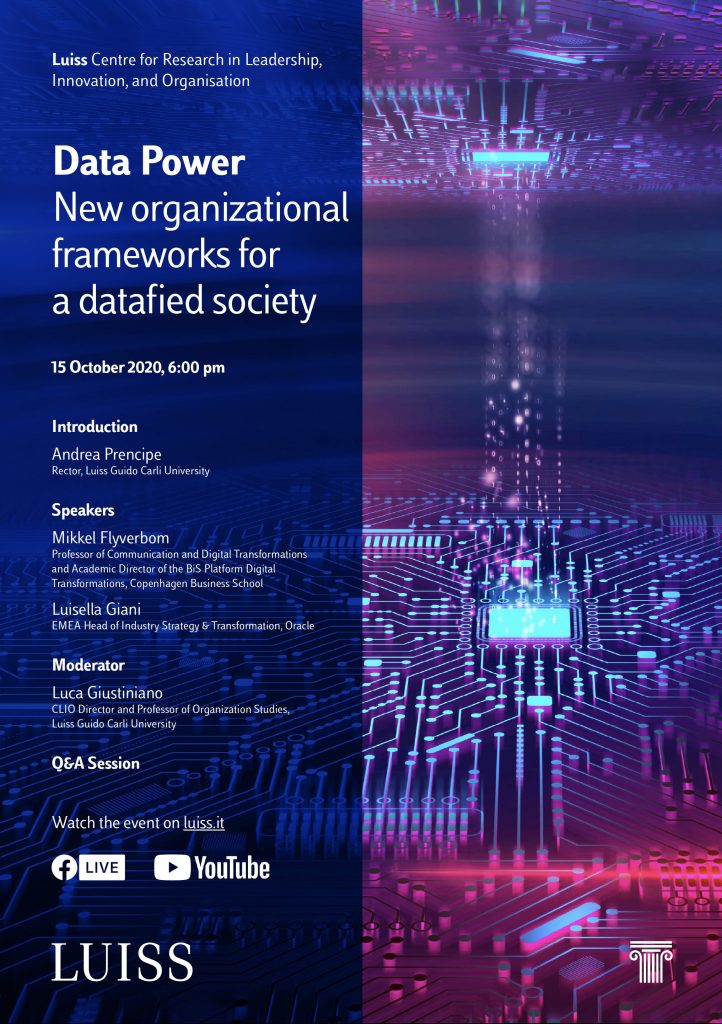
CLIO’s member prof. Fabian Homberg will join the Editorial Board of Review of Managerial Science (IF 2018: 2.393) as Associate Editor for the area Human Resource Management/Organizational Behaviour starting from August 1st, 2020.
Clio’s director Luca Giustiniano has been awarded the Luiss Teaching Excellence Award for being the best teacher in Master courses of the Department of Business and Management for the academic year 2018/2019!
Il direttore del Clio, Luca Giustiniano, è stato insignito del Luiss Teaching Excellence Award, premio riconosciuto al miglior docente nei Corsi di Laurea Magistrale del Dipartimento di Impresa e Management per l’Anno Accademico 2018/2019.
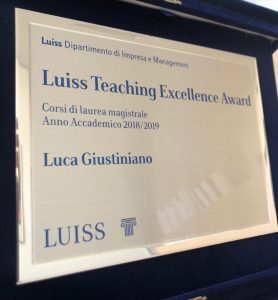
Clio’s member Antonio Daood – Research Fellow at Luiss Guido Carli University and Ph.D. Candidate at Sapienza University of Rome – presented the paper titled “The Unsung Role of Nonprofit Organizations in Value Creation: The Case of an Italian Food Bank“ (co-authored with Prem Sagar Menghwar) at the 6th World Open Innovation Conference – WOIC 2019, featuring the theme “Opening Up for Managing Business and Societal Challenges,” held at Luiss Guido Carly University in Rome (Dec. 12-13).
The paper has been awarded the conference Best Student Paper Award and a 1000$ cash award.
Evaluation of the external award committee:
“The paper breaks through stereotypes to offer a nuanced and insightful perspective on how non-profits and for-profits may together create value that neither type of organization can create alone.”
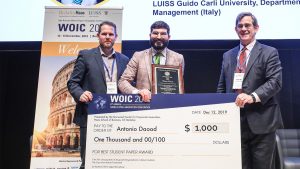
Nell’ambito del programma di attività del Centro di Competenza Cyber 4.0, finanziato dal Ministero per lo Sviluppo Economico e finalizzato a sviluppare servizi di orientamento, formazione e ricerca sulla Cybersecurity, il CLIO è alla ricerca di un Research Assistant. La risorsa supporterà lo sviluppo di progetti di ricerca, eventi formativi e tavoli di lavoro e la collaborazione con le strutture interne all’Ateneo e con i partner dell’Associazione Cyber 4.0.
REQUISITI:
- Laurea Specialistica / Magistrale: Economia, Scienze Politiche, Giurisprudenza;
- Precedenti esperienze in ambiti di Ricerca, Enti o Istituzioni afferenti la Cyber security e la gestione dei processi legati alla digitalizzazione;
- L’aver conseguito Master o altro corso di perfezionamento sui temi relativi l’innovazione digitale rappresenta un titolo preferenziale.
- Ottima conoscenza della lingua inglese scritta e orale;
- Ottima conoscenza del pacchetto Office;
- Approccio orientato ai risultati ed eccellenti capacità di problem solving;
- Ottime doti relazionali e predisposizione al lavoro di gruppo.
Completano il profilo capacità di adattamento a diversi ambiti di lavoro, autonomia organizzativa, capacità gestionali oltre che di pianificazione.
Le candidature dovranno pervenire entro le ore 24:00 del 15/10/2019, all’indirizzo di posta elettronica clio@luiss.it
I candidati saranno contattati telefonicamente se ritenuti idonei ed eventualmente convocati per un colloquio presso gli uffici dell’Università.
Nova School of Business and Economics (leader, Portugal), CASS Business School (UK), Geneva School of Economics and Management (Switzerlad), Luiss University (CLIO) and Rotterdam School of Management – Erasmus University (Netherlands) have rececently being notified that the Twinning project labeled as EURORPP has been granted (EU project 856688 – EUFORPP). The aim of the European Forum on Paradox and Plurality (EUFORPP) is to strengthen and stimulate scientific excellence and innovation capacity in this profuse field.
Some of the most pressing problems facing society and their organizations have traditionally been addressed by leaders and researchers with linear trade-off solutions. Ground-breaking research on paradoxes and plurality shows the dangers of this approach in terms of polarizing decisions and losing social and economic value that might be enhanced by dynamic, balancing and synergetic strategies.
The Forum intends to create long-term networking efforts among European institutions, and will raise research capabilities to all Partners. The Twinning project spreads over 36 months. With an inclusive approach to research, focused on co-creating knowledge with business ecosystems and the society at large, and an open interdisciplinary approach, the collaborative activities include the creation of impact labs to address specific themes with a paradoxical perspective, staff exchanges and visits, joint academic conferences, symposiums and business seminars, a summer school, and the development of a community of practice and web platform to promote dissemination and co-creation of knowledge with different stakeholders.
Please find out more at the official website of the Global Center of Paradox & Organization
In June 2019, 19th-20th, at the Kiev Polytechnic Institute in Kiev (Ukraine), it was held the final meeting of the MASTIS project (www.mastis.pro).
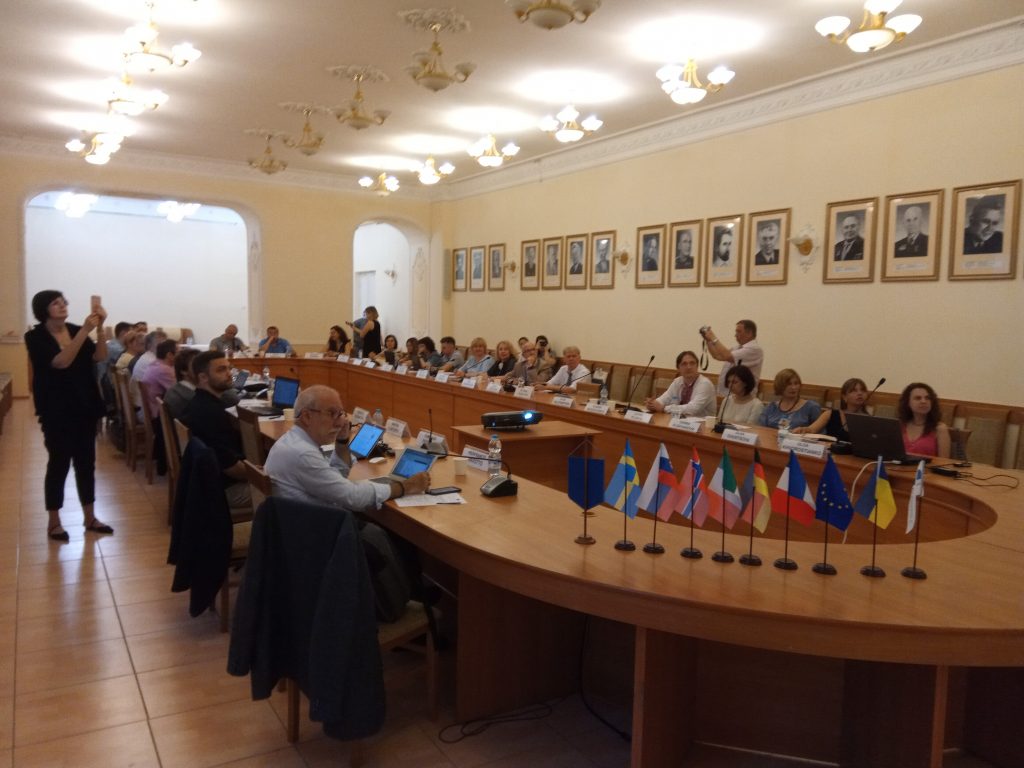
The MASTIS project has been funded by European Union within the Erasmus+ programme (561592-EPP-1-2015-1- FR-EPPKA2-CBHE-JPafter).
After a long preparation phase, the MASTIS project started in October 2015, with the aim of “Establishing Modern Master-level Studies in Information Systems” among European Universities.
A consortium of 17 Universities out of 11 countries was established. Among the consortium, the 8 Universities coming from France, Italy, Germany, Lithuania, Slovenia, Norway, Sweden and Liechtenstein played the role of contributors, while the 9 coming from Ukraine (7) and Montenegro (2) were the final recipients of the innovation. LUISS University was the Italian member of this consortium, with Prof. Paolo Spagnoletti, Prof. Alessio Maria Braccini and Prof. Tommaso Federici taking part to the project.
The MASTIS project has been a long, demanding project for most members, notably for the recipients Universities who were in charge of the main challenge, and for the co-coordinators prof. Jean-Hugues Chauchat (University of Lyon 2, France), and prof. Iryna Zolotaryova (University of Karkhiv, Ukraine) who both spent a great effort in maintaining the project on the established direction and focus.
After the final meeting, and also the former ones held in Montenegro and Ukraine, we may say that the MASTIS project achieved its main objectives: the eastern European Universities renewed their teaching infrastructures, changed many of their courses’ programmes, innovated their teaching methods and tools, revisited their degree processes.
Possibly even more than this, we may say that a great result has been the amount of knowledge and experiences about IS courses’ content and teaching methods shared along the projects among all participants. Not only the initially intended recipients, but also the other participant members gained a lot of hints and suggestions that they brought back to their academic institutions.
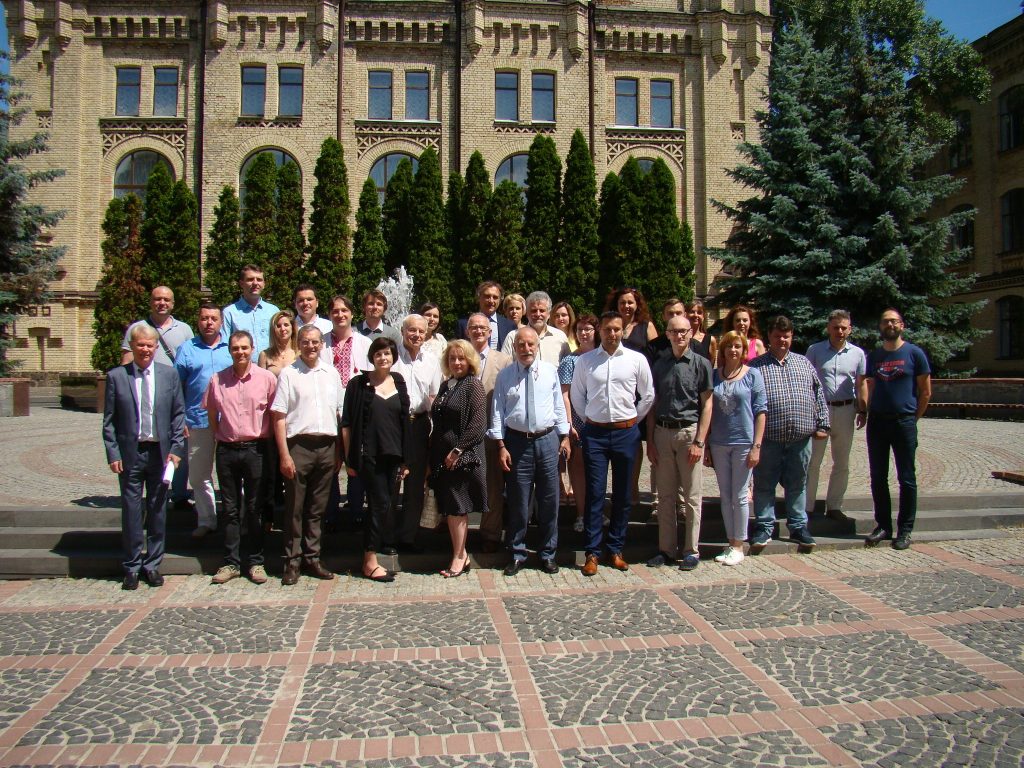
Beyond what delivered to the recipient Universities, the MASTIS project released several contents freely available (a great part in English) on the Moodle project platform: course programmes, lectures and other material possibly of interest for everybody who teaches IS courses may be found on this platform.
Clio’s director Luca Giustiniano and co-authors Arménio Rego, ISCTE – University Institute of Lisbon, Miguel Cunha, Nova School of Business and Economics, Flávia Cavazzotte, Pontificia Universida de Catolica do Rio do Janeiro), and Marcel Meyer, Universidad de Navarra), presented the paper titled “My Leader is Gritty – Me Too?“, at the Business Association of Latin American Studies – BALAS 2019 Annual conference in Lima, Perù (10-12 April 2019).
The paper has been awarded the conference prize “Lourdes S. Casanova Best Applied Paper Award”, a prize for outstanding scholarship and research.
Here’s a picture from the award cerimony:
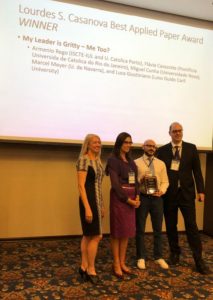
Il Professor Fabiano Schivardi, Prorettore alla Ricerca Luiss, vince il più prestigioso Grant europeo individuale, finanziato dal Consiglio Europeo della Ricerca (ERC) nell’ambito delle Social Science and Humanities, con il progetto ISEProD, Industrial Structure and the European Productivity Growth Divergence.
Clicca qui per leggere la notizia completa sul sito d’Ateneo.